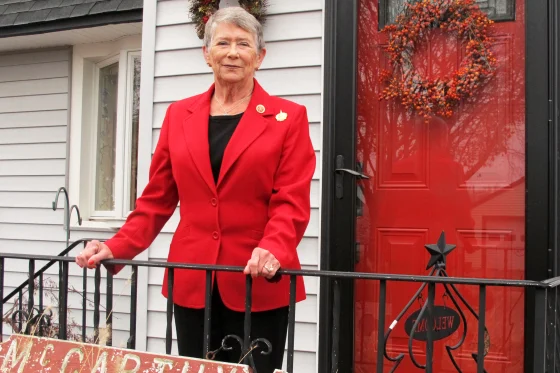Carolyn McCarthy, a former nurse turned congresswoman, passed away at the age of 81. She rose to national prominence after the 1993 Long Island Rail Road shooting, which killed her husband and seriously injured her son. This act of violence changed her life and later drove her to run for office, eventually serving nine terms in Congress.
The LIRR massacre was one of the most horrifying mass shootings in Long Island’s history. On December 7, 1993, gunman Colin Ferguson opened fire on a packed commuter train, killing six and wounding 19. The randomness and cruelty of the attack shocked the country. Among those deeply affected was McCarthy, whose husband, Dennis, died shielding others. Her son, Kevin, was shot in the head but survived.
Most people would have stayed home, grieving in silence. McCarthy didn’t. She transformed that pain into purpose, using her personal story to push for tighter gun laws. She challenged the idea that victims should remain voiceless. In 1996, she ran for Congress after her local representative voted to weaken the assault weapons ban. With no political background, she ran anyway—and won.
From Nurse to National Voice on Gun Control
Born in Brooklyn in 1944 and raised in Mineola, Carolyn McCarthy had a simple life before entering the world of politics. She became a nurse in the 1960s and worked for years at Glen Cove Hospital. Her dedication to helping others was clear even before she stood in front of the cameras or spoke in front of Congress.
After the shooting, McCarthy started by speaking at town halls, pressing lawmakers, and rallying communities. But what truly set her apart was how she turned personal loss into legislative action. She fought for background checks, supported bans on assault weapons, and insisted on safer gun storage laws.
She often said that she never dreamed of becoming a politician. But when she saw elected officials acting against public safety, she couldn’t stay on the sidelines. Her most famous quote still resonates: “You don’t know the strength you have in you until you are faced with what you have to deal with.”
Fighting the NRA and Facing Resistance in Washington
McCarthy earned respect and frustration from both sides of the aisle. She faced fierce resistance from the National Rifle Association and other gun rights groups. While some lawmakers quietly supported her bills, many refused to co-sponsor them. Still, she never backed down.
She helped pass over a dozen bills during her time in office. After Columbine and Virginia Tech, she pushed hard for changes in mental health reporting and gun show regulations. And following Sandy Hook, she didn’t hold back, even warning President Obama that she would call him out if he failed to act.
In Congress, she became known as the “gun lady”—a nickname she embraced. She wasn’t interested in political games. She was there to save lives. She once told the press, “I know what it’s like to get that call that changes your life. I don’t want other families to go through that.”
Personal Analysis: What Carolyn McCarthy Taught Us
Carolyn McCarthy’s story is about much more than politics. It’s about how one person, fueled by grief and love, can take on a national issue and refuse to let it go. Her work didn’t always lead to victory. Many of her proposals failed. Gun control in America remains a deeply divided issue. But what makes McCarthy’s legacy important is her persistence. She showed us that being ordinary doesn’t mean being powerless.
At a time when mass shootings have become far too common, we need voices like hers—voices that don’t come from fame or privilege, but from real-life experience. McCarthy wasn’t a polished politician. She didn’t speak in slogans. She spoke in facts and in pain. And that made her different.
Her passing marks the end of a chapter, but not the end of the story. The fight she started continues, carried forward by others who also refuse to give up.
Sources: CNN

